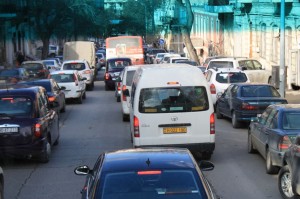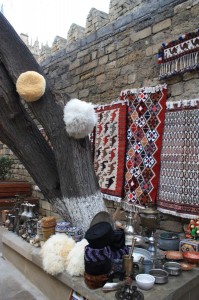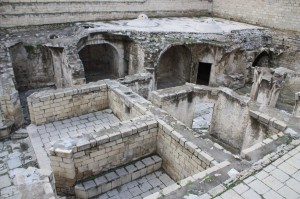I finally found a way to visit Baku (Azerbaijan) – just one day before the application deadline, I noticed that there is an interesting conference on the European Neighbourhood Policy and Eastern Partnership. I had several friends from Azerbaijan when I studied at CEU, so I had heard lots of stories about the country. But visiting there is not so easy. It’s not like Portugal or Malta, where I can jump on a plane any time. To apply for a tourist visa, one must present hotel reservations for each night and a letter from employer or another document stating that the visitor has enough money to travel. For a personal visit, there has to be an invitation. With an invitation from the conference, making a visa took a week and was relatively easy.
I flew via Istanbul and met three conference participants already on the plane. Next to me sat an Azerbaijani advertising specialist, flying home after closing a successful deal with a Turkish investor. As you’ve guessed, we soon started talking. He told us a few things about Azerbaijan, gave me a business card and told us to call in case I needed any help. When we got off the plane, he arranged a taxi for us. We exchanged a few emails and met once. During the later days I learned that it is very normal to talk to people next to you – something I really appreciate and don’t see much in Europe.
Unlike in Hungary, where the generation of 35- to 45-year-olds are a sort of sandwich generation that speaks no foreign language, the middle generation in Azerbaijan speaks both English and Russian. Young people speak Russian quite fluently too. Upper middle class kids, who got much of their education in Russian, are effectively trilingual, and the proximity between Azeri and Turkish allows them to safely say they speak three big languages. Of course, there are differences between Azeri and Turkish, for example, the word for ‘to get off [transport]’ in Azeri means ‘to fall down’ in Turkish. But Azeri-speakers are aware of these differences and able to make themselves understood in Turkish.
After annexation into the Russian empire, Azeris, like most Turkic nations, were extensively russified and made to add Russian endings to their family names. Nowadays most Azerbaijani family names end with either the Russian -ov/a or ethnic -li or -zade. Some people are changing their surnames back to their original forms. It’s interesting to know that Azerbaijan was the first Muslim nation to establish universal suffrage to women in 1918 (almost simultaneously with the newly established USSR), and the first secular school for Muslim girls in the Russian empire was opened there in 1901.
In addition to stories from my friends, my expectations about Azerbaijan were influenced from my father’s army stories. He traveled in Azerbaijan for two weeks in the 70s and told me about spicy food (‘red pepper with black pepper’) and people who routinely hold on to buses outside in order to ride without paying. Having spent almost a week in Baku, I didn’t see any of this. Food was greasy, but certainly not spicy.
We learned that during the holiday of Novruz (originally a Zoroastrian holiday, which greatly influenced Easter traditions and remained as one of the key holidays not only in Azerbaijan, but also in Iran, from where it was passed on to the Baha’i religion as well) people traditionally prepare this colorful table with sweets, pastries, colored eggs and wheat grass (looks very much like a Lithuanian Easter table).
I expected Azerbaijan to have imported more of the Turkish coffee culture, but I haven’t found good coffee anywhere. The local drink is tea – Azerbaijan produces its own. The brand is Azercay.
The city was full of cars – there are over a million of vehicles per two million inhabitants of Baku. One of the speakers at the conference told us that the city is full of ‘doctored’ German cars and that most traffic accidents involve a Mercedes. Reading WikiTravel before the trip, I was informed that traffic poses the greatest threat to visitors. Many people still bribe their way to getting a driving license.
The first day I had some 7 hours to explore the city. I arranged to meet my friend from CEU. While I was waiting for her, I went to look around the old town, which looks like any other old town in the world (some ancient buildings, some overpriced tourist shops) except that a part of it is a labyrinth, and locals told me that they wouldn’t go there unless they know where exactly to go. There are various shops that sell souvenirs, including pink fluffy military hats, traditional Caucasian hats, carpets, scarves, pointy slippers and so on. But unlike in the more touristy cities, salespersons are not pushy and don’t run after you to convince you to buy something.
In Soviet movies Baku old city ‘played’ Italy and even Argentina. But many places there reminded me of Malta.
One of the main tourist attractions is the 15th century shah’s palace. Our guide, knowing that there is a participant from Lithuania in the group, explained, “The stairs of from the palace to the shah’s mother’s tomb are very high – the shah commissioned them this way because he was very tall – like Sabonis (Lithuania)”. In addition to the Lithuanian NBA superstar, he also knew famous Lithuanian actors. In fact, I’ve never experienced so much positivity about the Baltic States as I did on this trip!
This hamam in the Old City is interesting because it had a heating system, allowing visitors to bathe outside.
Most tourists also climb the Maiden Tower, which was built in a shape of a key to defend against invaders from the sea. But when we got there it was closed.
The Old City appeared to be totally walkable and pleasant. I saw a carpet shop where weaving of a carpet could be observed from a window. Since it was winter, it was not very crowded.
In the next post I’ll write about the city center and other parts of Baku.






